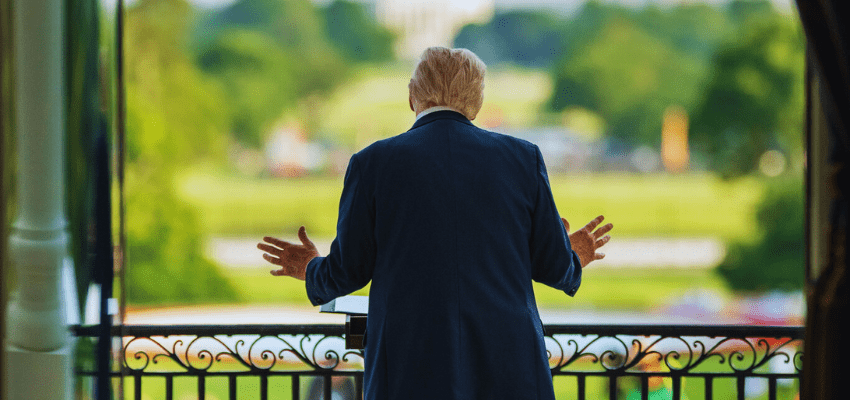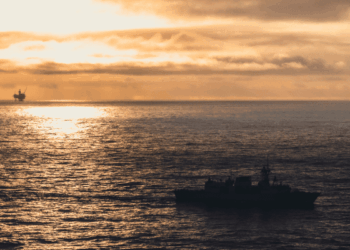This article originally appeared in the National Interest.
By Aurel Braun, June 6, 2024
In 2024, Americans voted for a plain-talking, bombastic, United States-centric president. He promised to end moral preening, cease American involvement in foreign conflicts, and stop much international bloodshed. Indeed, Donald Trump has taken the title of disruptor as a badge of honor. He’s had warm words for dictators like Russian President Vladimir Putin, while offering little sympathy for Ukraine.
Nonetheless, upon returning to the White House, he promised to peacefully conclude Russia’s war of aggression within 24 hours. Now, 100 days into his presidency, the world is still waiting.
US allies are currently watching to see if Trump will be “mugged by reality” and finally appreciate that he is being played by Putin, who is not interested in a genuine settlement of the war. The US president’s thinking, however, is exceedingly difficult to decipher. In a virtual replication of the mysticism of Kremlinology, analysts and foreign leaders parse Trump’s words and track his moods.
Who Influences Trump’s Decisions?
Under Trump, foreign policy changes have been reduced to mere hours as he pursues a mix of geopolitical isolationism, disruptive tariffs, and relentless pressure on NATO allies to increase defense spending drastically, all while coddling dictatorial or illiberal governments from Russia, Hungary, and multiple nations of the Middle East.
With unquestioning faith in his own negotiating abilities, Trump appears convinced that he can control the international political environment, make America great in his image, and end wars.
However, such insistence on his omniscience and hopes of omnipotence have led to an infantilization of the American presidency, where expertise and reality have given way to outlandish flattery and unbound positivity. Expert advisors do not last long in his orbit, or have to sugarcoat bad news, see the ousting of National Security Advisor Mike Waltz, the marginalization of Ukraine special envoy General Keith Kellogg as prominent examples.
Instead, the president is seemingly under the sway of “Trump whisperers,” from his unctuous Vice President JD Vance to the fired Fox TV host Tucker Carlson, a self-described isolationist. Most of those who have Trump’s ear view Russia with favor and Ukraine with disdain.
For close observers of Trump, there have been some whiffs of hope.
He has expressed occasional frustration that Putin might be just “tapping him along.” He has repeatedly told the Russian president to “Stop it, Vladimir” after particularly egregious Russian attacks on Ukrainian civilians. It has been more than a wish among Western leaders that in this Trumpian maelstrom, reality would prevail over fantasy. The president has even threatened new sanctions. The problem is these threats have been like feathers in the wind, and Putin himself seems to have become an adept “Trump whisperer.”
Putin seems to conduct a masterclass in manipulation when dealing with Trump, drawing on his KGB training to use “reflexive control,” where the operator plays on the predilections of the target. The Russian leader has also employed a particularly creative combination of fear and flattery, from threatening World War III to lavishly praising the US president and his wife. Further, Putin invariably dangles vast lucrative trade and investment possibilities to a mercantile president who insists that he is ultimately a winner in all interactions. Consequently, Trump invariably claims he has won.
All this is helped by various “Trumpian realities”: personal relations are prime; a natural affinity for the Russian dictator and visceral dislike of the Ukrainian leader are the norm; and Trump seems to imagine the Russian Federation as a Soviet Union equivalent, even though it is merely a poor remnant of that old superpower.
Why Is Trump So Friendly with Russia?
Specifically, Trump is focused on two goals in a big power game with Russia that would, in his view, end the war. First, Trump has been working under the assumption that Moscow could be detached from its alliance with Beijing. Second, in terms of transactional terms, Trump seems convinced that Russia has limitless investment and trade opportunities.
Trump is wrong on both accounts—even if his goals, “commerce, not chaos,” and building instead of bombing, are desirable and noble.
In reality, Russia is very much a junior partner of China. Moscow has become far too dependent and indebted to Beijing to switch alliances. Putin may have mortgaged the future of his country to preserve personal power, and in this, he is more mafia than Machiavelli.
Further, investment and trade opportunities in Russia are far more limited than what Trump seems to imagine. Russia, under Putin, has failed economically. Its nominal GDP is only about the size of Italy’s. It is energy-dependent and inefficient, except for some pockets of excellence. Crucially, it lacks any kind of credible business law or independent courts.
Given Putin’s impressive manipulative skills and Trump’s predisposition and predilections, it should not be surprising then that any intent Trump might conceivably have to punish Russia for its continuing aggression and intransigence melts like an ice cube in summer sun when he speaks with the Russian leader.
Following a two-and-a-half-hour phone call on May 19, the president suggested someone else could now take the lead on peace negotiations, perhaps the new Pope. Trump ominously suggested he might walk away from trying to settle the conflict. In such an event, it’s unclear whether the US would continue to provide crucial military support, which, as of now, other NATO allies are not in a position to supply.
If American military support continues, Ukraine would remain in a good position to reach a favorable settlement as time would not be on Russia’s side, given its unsustainable losses and increasing economic difficulties. If, however, the US ceased or significantly cut Kyiv’s military backing, this could leave Ukraine in dire straits, drastically shifting the balance in Russia’s favor. This would be a Chamberlain-like betrayal despite Trump’s expressed admiration for Churchill.
Putin’s maximalist goals in Ukraine show he refuses to accept the post-Cold War settlement in Europe, including the defined borders and enlarged NATO. Moreover, following gift after gift by Trump to Russia, from taking Ukraine’s membership in NATO off the table to refusing to join the Europeans in new sanctions or blocking the G7 from rightly blaming Russia for starting the war in Ukraine, there has been no Russian reciprocity whatsoever.
Trump Forces Other NATO Countries to Step Up
On the positive side, through brutal pressure, dismissiveness, and threat of disengagement, Trump has managed to coerce the European Union members to embark on long overdue dramatic increases in defense expenditures. It’s a shift meant to confront the reality of the Russian threat. Though salutary, scaling up European defenses will take time.
As the former NATO secretary general, Anders Fogh Rasmussen, sagely noted, it has to be “a coalition of the willing, not of the waiting.” The European Commission’s ReArm/Readiness 2030 plan seems ambitious, but it must be expedited to address the pressing military emergency.
Canada, has been among the most significant laggards in G7, acting as if it could lead a charmed international existence without adequate defense spending. This illuminates some of the problems of gravely atrophied defense capabilities. Canada has the lowest defense expenditure among the G7, at a grossly inadequate 1.37 percent of GDP.
Prime Minister Mark Carney, though signaling in his new government’s Throne Speech, a desire to significantly increase Canadian defense capacity, has provided only one concrete indicator of reaching a meagre, outdated 2 percent by 2030. The vast majority of the other NATO states achieved that landmark by 2024.
It’s premature to give up hope that Trump will, at some point, recognize the reality of Putin’s aggressiveness and clever manipulation. However, hope is hardly a geopolitical policy. Ukraine needs at least two key commitments. First, the US should at the very least provide “bridging” military support until the Europeans, led by German Chancellor Friedrich Merz and his revitalized military, can provide Ukraine with the defensive necessities even after a cessation or drastic reduction of American military aid. Second, the West, collectively, must realize that constructive engagement with Russia is an illusion under Putin, and only a new containment will manage the ongoing threat from Moscow.
Trump may continue to dislike Zelensky, admire Putin, and view the Europeans with contempt. He may persist in falsely believing he can persuade Russia to switch alliances, and that Russia presents astonishing investment and trade opportunities.
However, if Ukraine falls as a result of Trump’s withdrawal of seminal military support, or even if it is left helpless and hopeless after a Russian-imposed settlement, the loss would reverberate far beyond Ukraine’s borders. Trump would own the avoidable debacle, and with it, an inconvenient truth: his legacy would be forever poisoned.
Aurel Braun is currently a Professor of International Relations and Political Science and a Fellow of Trinity College at the University of Toronto, as well as a Advisory Board Member with the Macdonald-Laurier Institue.








